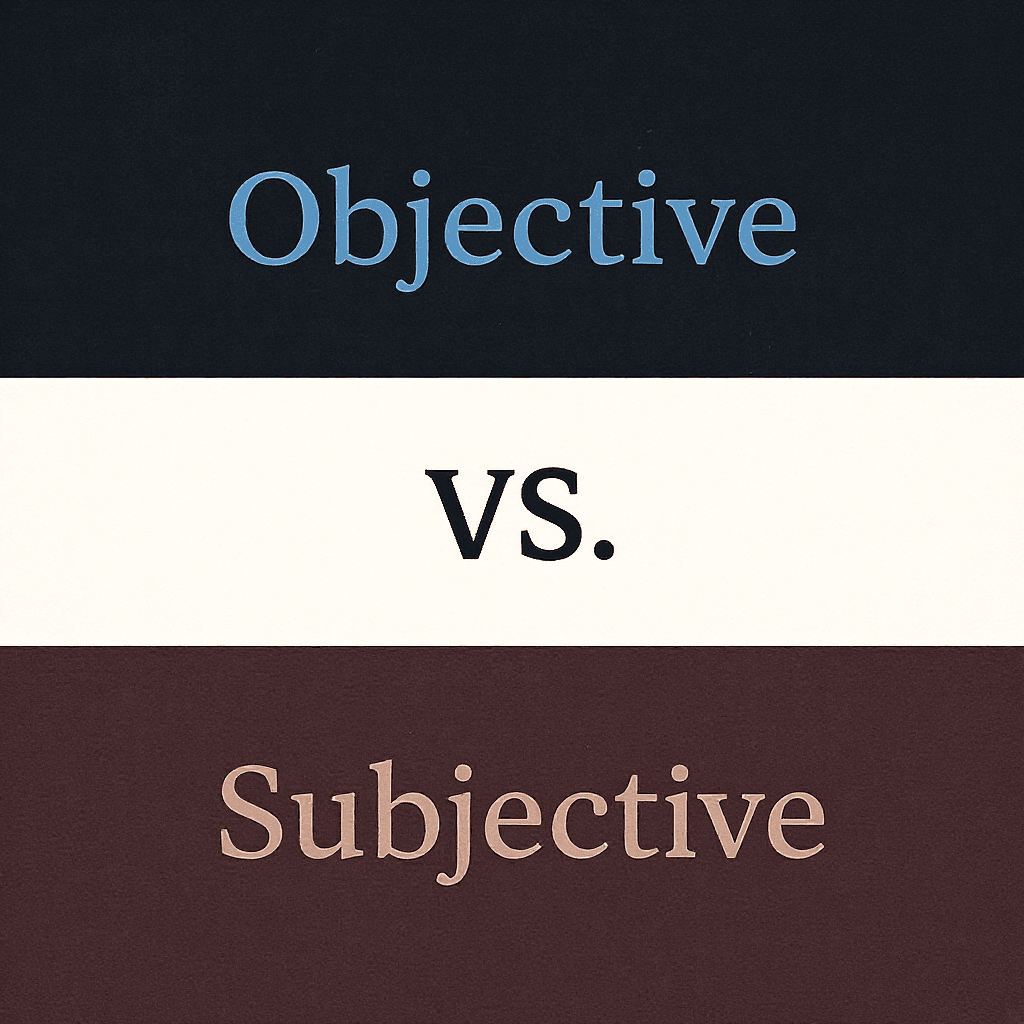“Objective” vs. “Subjective”: What’s the Difference?
 People often confuse objective and subjective because both describe opinions, decisions, or judgments.
People often confuse objective and subjective because both describe opinions, decisions, or judgments.
The key difference is where the truth comes from — facts or feelings.
Let’s explore each word with simple meanings and examples.
Objective: Based on Facts
Meaning
“Objective” means something is based on facts, evidence, or reality — not influenced by personal emotions or opinions.
When something is objective, it can be proven true or false.
Examples of “Objective” (10 total)
- The news article gave an objective report of the event.
- Scientists try to remain objective during experiments.
- Grades are based on objective test results.
- The camera provides an objective record of what happened.
- It’s hard to be objective when your best friend is involved.
- The judge must stay objective in every case.
- The data offers an objective look at climate change.
- His decision was based on objective facts, not opinions.
- The company’s objective is to increase sales by 20%.
- The research used objective methods to avoid bias.
🧠 Tip:
If it’s measurable, testable, or observable — it’s objective.
Subjective: Based on Feelings or Opinions
Meaning
“Subjective” means something is based on personal feelings, tastes, or opinions rather than facts.
It changes from person to person.
Examples of “Subjective” (10 total)
- Beauty is a subjective concept.
- His review of the movie was completely subjective.
- Music preference is always subjective.
- Her subjective mood affected her decision.
- The judge’s opinion seemed subjective.
- Comfort is a subjective experience.
- Art appreciation is highly subjective.
- Some people think spicy food tastes better — that’s subjective.
- Happiness is a subjective feeling.
- His feedback was more subjective than useful.
🧠 Tip:
If it’s emotional, personal, or opinion-based — it’s subjective.
Quick Comparison Table
| Word | Meaning | Based On | Example |
|---|---|---|---|
| Objective | Factual, unbiased | Facts, data, truth | The test score is objective proof of skill. |
| Subjective | Personal, emotional | Feelings, opinions | Taste in music is subjective. |
How to Remember the Difference
👉 Objective = Outside yourself → O for Out → facts, data, truth
👉 Subjective = Inside yourself → S for Self → opinions, emotions
“Objective truth doesn’t depend on you.
Subjective truth depends entirely on you.”
Why This Difference Matters in Writing
Being clear about objective vs. subjective helps you write more persuasively.
AI-generated text often blends emotion with fact in unnatural ways.
That’s why tools like Humanizey help refine AI text — keeping the facts accurate while giving opinions a more natural, human tone.
FAQ
1. Can something be both objective and subjective?
Yes — for example, reviews often include both facts (objective) and opinions (subjective).
2. Is science objective or subjective?
Science aims to be objective, though interpretation can include subjective bias.
3. How can I make my writing more objective?
Use data, avoid emotional language, and back up claims with evidence.
4. What’s an example of subjective bias?
Choosing a favorite candidate because you “like their vibe” — not their record.
Practice: Choose the Correct Word (“Objective” or “Subjective”)
(Answers are listed at the end.)
- The report was based on ___ facts and data.
- Taste in food is highly ___.
- The scientist tried to stay ___ during testing.
- His opinion of the artwork was ___.
- An ___ test score shows actual performance.
- Love is a ___ feeling.
- News should be ___ and factual.
- Comfort depends on personal preference, so it’s ___.
- The committee used ___ measures to grade students.
- Movie reviews are usually ___.
Answers
- objective
- subjective
- objective
- subjective
- objective
- subjective
- objective
- subjective
- objective
- subjective
